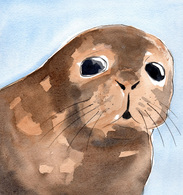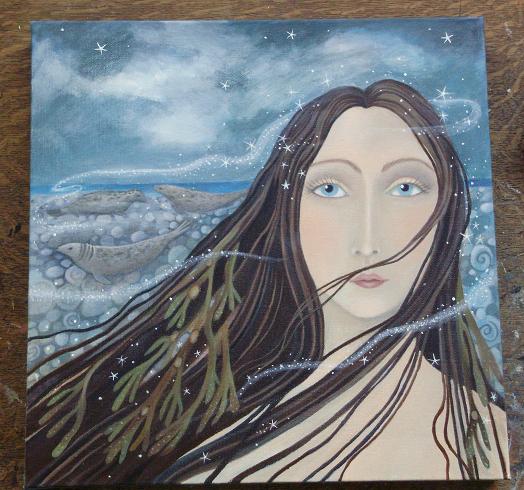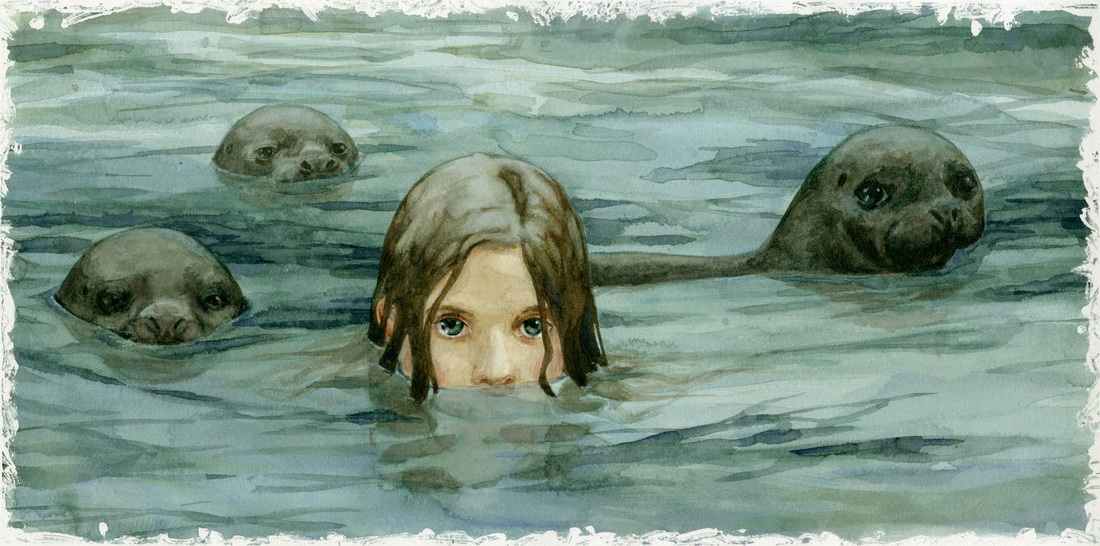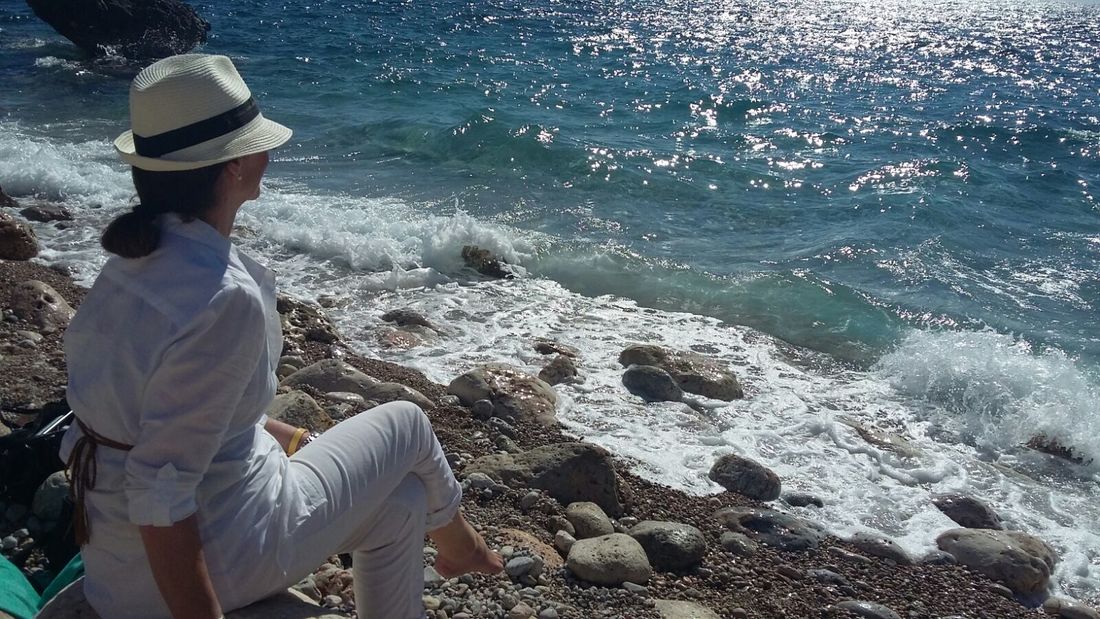The Selkie Bride - adapted by
Anne Maria Clarke

“Long ago when the moon was full and the human folk were sleeping,” someone may have begun, “the Selkie and her sisters emerged from the deep, slithered onto a big rock close to the shoreline and slipped effortlessly from their sleek seal skins, discarding them like coats - and then they danced –as human women dance and sang as human women sang, but not quite - because they were not quite as human women are.
Now it happened just then that a lonely fisherman was returning late to shore and saw them from afar shedding their skins and dancing in the moonlight; their long black hair flowing like waves over their white shoulders as they swayed and twirled and abandoned themselves to the rhythm of their song. Free as birds they seemed to him then, without sorrow or care and their voices rang out across the water, clear and pure and full of love.
The fisherman led a solitary life. He was a hard working man who took very little time for the pleasures of the heart. Yet all men desire such things and the lonely man in this story was no different. How he longed for a wife, to snuggle up with by the fire and to share his bed at the end of the day, but sadly there were no young women for miles & miles around.
Well for a long time he listened to the Selkies beautiful song and watched them dancing from afar. For the most part they paid him no heed, even though they knew he was watching. They were not overly enamoured by human folk you see. The older ones had heard tell of abductions and the wise ones among their kinsfolk issued strong warnings to all who would venture too deeply into the human world. But the youngest was inquisitive and sorely drawn to the land and to the warm bloodied folk who lived there and secretly she took pleasure in the man’s attentions. She was the sweetest and most trusting of the sisters – but she was also the most naive.
In fact, she was everything the lonely man had been dreaming of and as he watched her, he began to forget himself – a madness crept over him, gripping him with desire and he began to plot.
Well the Selkies danced on until just before dawn, when they took up their skins and slipped back into the sea.
A whole month passed and every night the fisherman rowed out eagerly to the rock, drew up his boat and waited out of sight but the Selkies never came - until the next full moon. All then occurred as before, as well you might expect, and the sisters emerged once more from the deep, slithered on to the rock, shed their skins and were soon lost in girlish abandon.
It was easy to steal the skin of the girl he wished for, as neither she nor any of her sisters apprehended him this time or even noticed that the youngest Selkies skin was stolen until it was much, much too late. Without her skin she could not return to the deep. She searched and searched but could not find it and shivering with fright she cried out to her sisters to help her. But they were all long gone, down into the depths where they could no longer hear her cries.
And that was then the lonely man stepped out from hiding to help her, or so in her innocence it seemed to her then. He offered to look after her if she wished and he took her to his little house, wrapped her in soft blankets and lit a huge, roaring fire in celebration of her arrival. Later, when she was sleeping, he hid the stolen skin in a place where she would never ever find it.
Soon after she became his wife.
Well at first all went well and she hardly missed her seal-skin at all or her life beneath the waves and those of her own kind whom she had forsaken. She loved her human life and her human home and the warm fire that spat and crackled in the grate – and the duck down quilt and soft pillow and the warm embrace of her husband at the end of each day. She learned to cook and sew and keep house as well as ever any human woman did and in time she grew big with child and gave birth to a strong, healthy son. It seemed for a time that her happiness was complete.
But it did not last long.
She didn’t notice the changes at first you see. She thought only that she was tired because of the birth and the endless hours spent tending to her child and the seemingly ever increasing needs and demands of her husband – but as the months passed such weariness came over her that she could no longer live as before.
Her limbs began to ache, her eyesight dimmed and her glossy black hair became dull and dry and fell from her scalp in brittle clumps as she combed it. It was then that she began to realise what she had done.
“If only I could find my skin once more,” she cried to her husband, “so that I might return to the sea now and then, to visit my sisters and my home beneath the waves. The lack of moisture here is withering me so. I shall be old before my time and I fear you will not love me by and by."
“Be silent wife,” her husband commanded, for he was sore afraid of loosing her.
“Your home is with me now and the bonny babe in your arms. Forget the sea and your life beneath the waves. It is passed and you may not return.”
But she did not forget – how could she – and each moment thereafter, she wished for the return of her skin and the more her husband counselled her to forget, the more she remembered and the more deeply she yearned for that which she had lost.
Her interest in human home-making waned, even though it vexed her husband. She no longer cooked the warm winter broth over the fire, nor baked the bread he relished so much. Instead she served cold raw fish and sea kelp on salt blanched, scalloped shells washed up on the tide.
And though he saw the yearning and the longing taking hold of her – though he saw the pitiful withering away for lack of that which was rightfully hers, still he kept her seal-skin hidden.
“Think of your son,” he implored her, “and cease your hankering after the sea.”
But inside he knew, in a secret place where all is understood – he knew he had taken her unlawfully. He knew he had stolen her from her own, from the sea, her element, her home. Without the sea, her kinsfolk and her wild girlish freedoms, she could not thrive. He knew! But he also feared he could not live without her and so he continued on and on to lie about the whereabouts of her skin.
Each day whilst he was out fishing she wandered the shoreline with her tiny babe cradled in her arms and all the while she sang to him in a strange tongue and told him stories of the life she had known beneath the sea. What she shared we cannot even begin to fathom, even if we could decipher her words – but the child knew, as surely as he knew his mothers scent.
Time passed and the babe grew to a boy. The little cottage was now full to the brim of flotsam and jetsam from the sea which his mother collected each day from beach. It did not seem at all strange to him but his father loathed it almost as much as he loathed the raw fish and salty kelp that she served up for supper. But still he held on to what he knew.
Well things could not go on forever in this way and soon enough the Selkie’s sisters rose up from the deep to reclaim her, for they knew that if she stayed overlong in the human world she would perish. That night, her son was awakened by a sharp gust of wind that blew open his window. As he went to shut it he heard a cry from the sea, a sad, mournful lament in the strange yet familiar tongue of his mother. He ran down to the shoreline, where the seals were bobbing about in the waves. And in that same tongue, they told him where his mother’s skin was hidden.
Without thought of himself he made haste for that place, far away from his mother’s failing eyes – and as he drew close he sensed it, sniffed it – his mother’s sweet scent that he knew so well.
Next morning the precious skin lay beside her when she awoke. Her husband was still sleeping beside her oblivious of what had occurred – she looked across at him, stretched out her human hand, placed it gently on his heart and forgave him his weakness. She bore him no ill will but knew, beyond a shadow of a doubt that this was the moment to leave.
She pulled the familiar soft, damp fur over her limbs and with her beloved son beside her they made haste from the cottage down to the edge of the sea and without ever a single glance behind – they were gone.
No one knows what became of the lonely fisherman.
That's another story.
But we do know that after a time, the child returned – now grown into a fine young man – and he made his way cheerfully into the wide world, telling tales and singing songs of wonder -
- yet whenever the moon was full and wherever the sea was deep and cold enough for seals - there they would be - mother and son together again - between the land and the sea.
The Selkie Bride
I adapted this tale a while ago. I will record it by & by with a little music - but for now it is at it is – a story to be read rather than listened to – dedicated to all those women and girls, known & unknown, who have in their innocence, lost touch with parts of themselves, of their souls, that it is not possible to live fully without.
It is a cautionary tale for girls not yet grown - & for their older sisters who like the Selkie Bride may have already lost their soul -skins & may not yet have realised why they feel as weary as they do.
So if you are a mother, read it aloud to your daughters & if you are daughter like the Selkie Briide, read it to yourself & remember – it’s never, ever too late to find & reclaim those parts of yourself that have been lost!
Much love
Anne Maria Clarke
x x x
http://www.youtube.com/c/annemariaclarke
More fairy-stories, myths & legends by
Anne Maria Clarke
http://www.archivepublishing.co.uk
www.annemariaclarke.net



